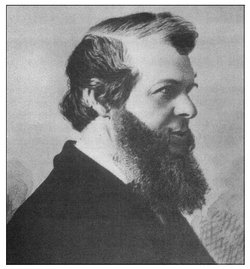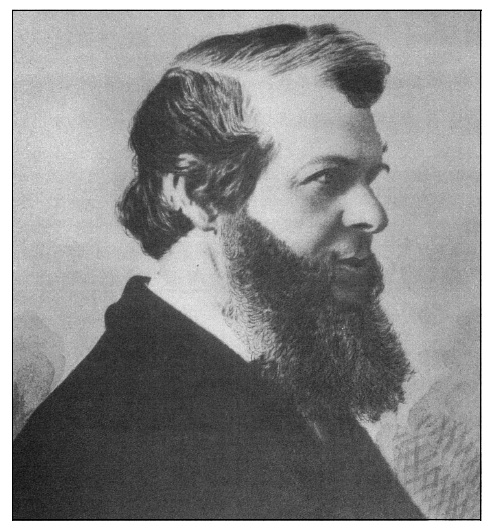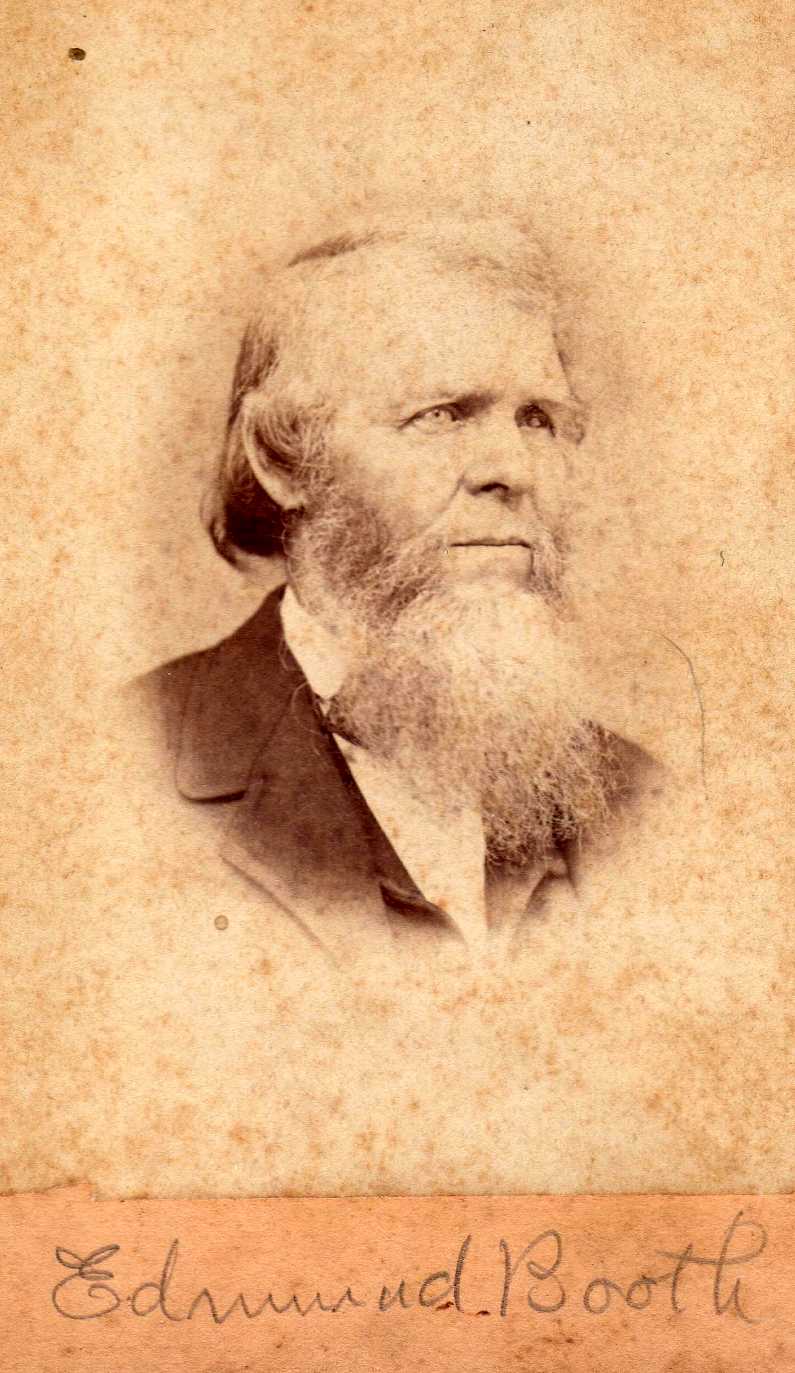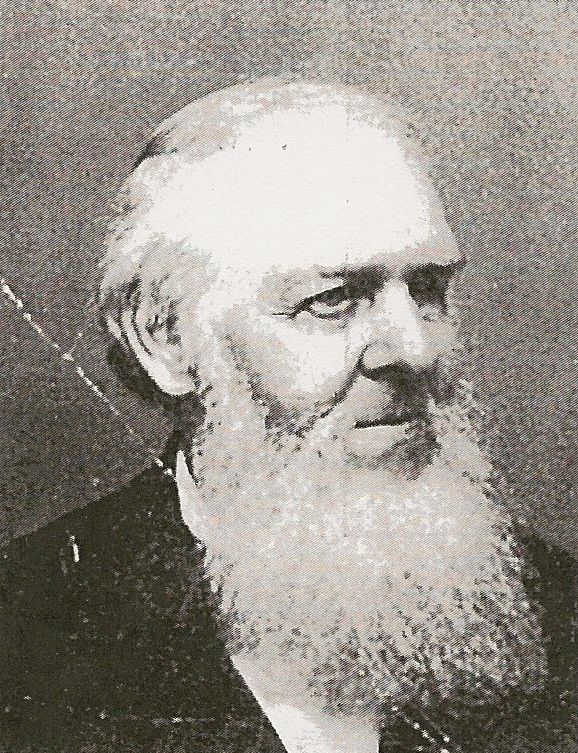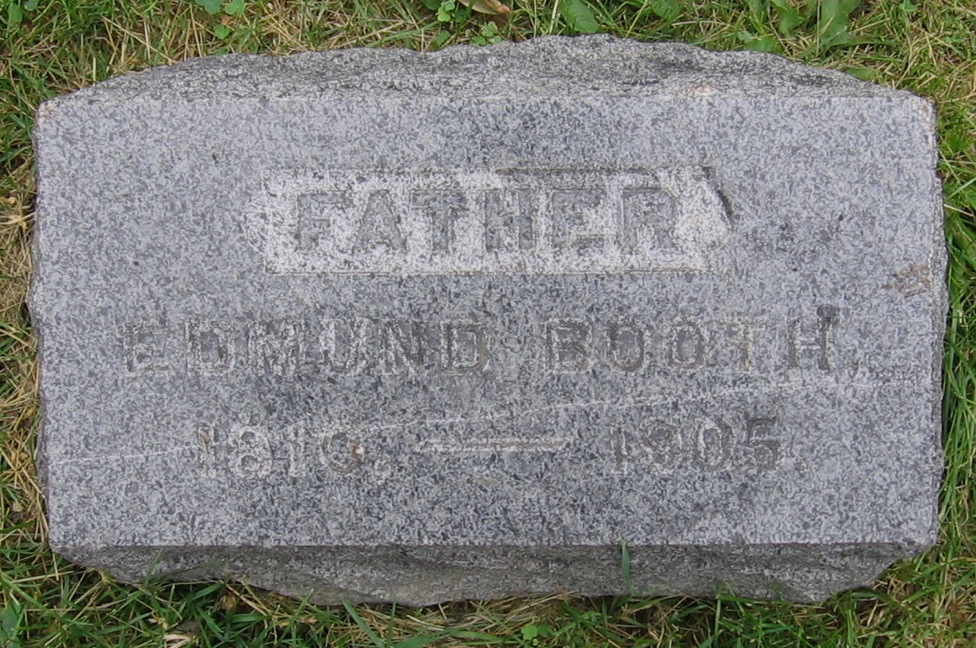Booth was an ardent abolitionist, and his newspaper had considerable influence in the surrounding area. His outspoken anti-slavery views earned him the ire of local Confederate sympathizers, to the point where his wife feared for his safety. Fortunately, the attacks on him were verbal rather than physical, and being deaf, he could simply smile and nod as his opponents raged at him.
All his life, Edmund Booth championed education for the deaf. He became the "Honored Nestor" of the deaf community (referring to the poet Homer's wise and aged counselor). As one of the three co-founders of the National Association of the Deaf (NAD) in 1880, he presided as the temporary chair of the first convention of that organization.
His home in Anamosa, Iowa, has been listed on the National Register of Historic Places.
1880: THE NATIONAL ASSOCIATION OF THE DEAF FOUNDED:
THE GENESIS OF THE NATIONAL ASSOCIATION
By George William Veditz
From DEAF-MUTES JOURNAL
Thursday June 1, 1933
. . . Edmund Booth was made Chairman of the National Executive Committee, and H. C. Rider, Secretary. This committee with a membership of twenty-three was instructed to prepare a Constitution and By-Laws to be submitted at the next convention. I met Mr. Booth thirteen years later at the 1893 World Congress of the Deaf in Chicago, and I see him in my memory's eye, in his habit as he lived, huge, patriarchal, undiminished in either physical or mental vigor, an old man eloquent at eighty-four, when responding to an invitation to address the Congress he said among other things: " * * You think that you are at the very pinnacle of achievement and civilized convenience and comfort, but let me tell you that your grandchildren looking back upon you will think that you were savages."
Mr. Booth had been isolated in his western home [i.e., in Iowa] so far as meeting the deaf was concerned, but the hinges of his arms and fingers were unrusted, and the light of his eyes was clear and bright, and I have never seen a more forceful or a clearer sequence of ideas. The language of signs once learned never died. But even a person like Mr. Booth, using speech all of his life, associating with the hearing to the practically complete exclusion of fellow deaf-mutes, because there were none to meet, must have felt that he was isolated. Mrs. Veditz, during a visit to Anamosa [Iowa, where Booth lived], was probably the last deaf-mute he was destined to meet, and he did complain to her and spoke of his loneliness and of his happiness to meet once more a deaf-mute using the sign language and handicapped as he was himself, before the final summons came. That was, I think, in 1901. [His wife, also deaf and using Sign, had died in 1898.]
Booth was the first successful deaf-mute publisher. His paper, the Anamosa Eureka, was for years the official publication of Jones County, Iowa. Occasional copies came my way during his lifetime, and I admired its efficient, business-like appearance. It antedated by many years Wells Louet Hill's Athol, Mass., Transcript, and William Woodruff Beadell's New Jersey publication. Booth, always eight years older than the Hartford school*, was beyond doubt the greatest American deaf-mute of his generation, and I am glad to render him this tribute. . . .
*[now the American School for the Deaf, the oldest of its kind in the United States, and the birthplace of American Sign Language]
From The Daily Republican (Monongahela, PA), 31 March, 1886: "THE WORK OF DEAF MUTES
". . . At Anamosa, Ia., Mr. Edmund Booth, a mute, was once postmaster of that place, and I mistake not was elected county clerk. He was once engrossing clerk for the State legislature. Mr. Booth has built up a newspaper in his town and his pen furnishes the editorial matter. He went to Anamosa, when it was comparatively unknown, and by his pen and influence has made the place a prosperous town. There are several newspapers published in the United States (owned and edited by deaf mutes) for hearing people, and the influence of the editors politically is equal to that of any editor who can hear and speak. . . ."
(Originally published in the Brooklyn Eagle.)
A very progressive article for that time!
The tribute below was written by Rev. J. W. Davidson, long-time friend of the family, who knew Edmund very well.
NINETY YEARS OF SILENCE
Written in Memory of Edmund Booth
His mother’s songs he heard; then silence fell.
To him all noiseless was his schoolmates’ play,
And birds with songs unheard filled all the day.
“Sad, sad,” men sighed, “that he apart must dwell
As in a voiceless world.” But let his life’s work tell
How strong the resolute soul; how mighty they
Who beat beneath their feet the fears that sway
The timid and the weak. A proud farewell
We speak. For thou hast stood life’s testing pain;
Thou wast the conqueror of thine adverse fate;
Sight of the soul far-reaching, thou didst gain;
*Cry of the wronged made thee articulate;
Rights of the dumb thou didst with might maintain;
Deeds like thy Lord’s; these we commemorate.
*Obviously a reference to Edmund’s hatred of slavery.
Booth was an ardent abolitionist, and his newspaper had considerable influence in the surrounding area. His outspoken anti-slavery views earned him the ire of local Confederate sympathizers, to the point where his wife feared for his safety. Fortunately, the attacks on him were verbal rather than physical, and being deaf, he could simply smile and nod as his opponents raged at him.
All his life, Edmund Booth championed education for the deaf. He became the "Honored Nestor" of the deaf community (referring to the poet Homer's wise and aged counselor). As one of the three co-founders of the National Association of the Deaf (NAD) in 1880, he presided as the temporary chair of the first convention of that organization.
His home in Anamosa, Iowa, has been listed on the National Register of Historic Places.
1880: THE NATIONAL ASSOCIATION OF THE DEAF FOUNDED:
THE GENESIS OF THE NATIONAL ASSOCIATION
By George William Veditz
From DEAF-MUTES JOURNAL
Thursday June 1, 1933
. . . Edmund Booth was made Chairman of the National Executive Committee, and H. C. Rider, Secretary. This committee with a membership of twenty-three was instructed to prepare a Constitution and By-Laws to be submitted at the next convention. I met Mr. Booth thirteen years later at the 1893 World Congress of the Deaf in Chicago, and I see him in my memory's eye, in his habit as he lived, huge, patriarchal, undiminished in either physical or mental vigor, an old man eloquent at eighty-four, when responding to an invitation to address the Congress he said among other things: " * * You think that you are at the very pinnacle of achievement and civilized convenience and comfort, but let me tell you that your grandchildren looking back upon you will think that you were savages."
Mr. Booth had been isolated in his western home [i.e., in Iowa] so far as meeting the deaf was concerned, but the hinges of his arms and fingers were unrusted, and the light of his eyes was clear and bright, and I have never seen a more forceful or a clearer sequence of ideas. The language of signs once learned never died. But even a person like Mr. Booth, using speech all of his life, associating with the hearing to the practically complete exclusion of fellow deaf-mutes, because there were none to meet, must have felt that he was isolated. Mrs. Veditz, during a visit to Anamosa [Iowa, where Booth lived], was probably the last deaf-mute he was destined to meet, and he did complain to her and spoke of his loneliness and of his happiness to meet once more a deaf-mute using the sign language and handicapped as he was himself, before the final summons came. That was, I think, in 1901. [His wife, also deaf and using Sign, had died in 1898.]
Booth was the first successful deaf-mute publisher. His paper, the Anamosa Eureka, was for years the official publication of Jones County, Iowa. Occasional copies came my way during his lifetime, and I admired its efficient, business-like appearance. It antedated by many years Wells Louet Hill's Athol, Mass., Transcript, and William Woodruff Beadell's New Jersey publication. Booth, always eight years older than the Hartford school*, was beyond doubt the greatest American deaf-mute of his generation, and I am glad to render him this tribute. . . .
*[now the American School for the Deaf, the oldest of its kind in the United States, and the birthplace of American Sign Language]
From The Daily Republican (Monongahela, PA), 31 March, 1886: "THE WORK OF DEAF MUTES
". . . At Anamosa, Ia., Mr. Edmund Booth, a mute, was once postmaster of that place, and I mistake not was elected county clerk. He was once engrossing clerk for the State legislature. Mr. Booth has built up a newspaper in his town and his pen furnishes the editorial matter. He went to Anamosa, when it was comparatively unknown, and by his pen and influence has made the place a prosperous town. There are several newspapers published in the United States (owned and edited by deaf mutes) for hearing people, and the influence of the editors politically is equal to that of any editor who can hear and speak. . . ."
(Originally published in the Brooklyn Eagle.)
A very progressive article for that time!
The tribute below was written by Rev. J. W. Davidson, long-time friend of the family, who knew Edmund very well.
NINETY YEARS OF SILENCE
Written in Memory of Edmund Booth
His mother’s songs he heard; then silence fell.
To him all noiseless was his schoolmates’ play,
And birds with songs unheard filled all the day.
“Sad, sad,” men sighed, “that he apart must dwell
As in a voiceless world.” But let his life’s work tell
How strong the resolute soul; how mighty they
Who beat beneath their feet the fears that sway
The timid and the weak. A proud farewell
We speak. For thou hast stood life’s testing pain;
Thou wast the conqueror of thine adverse fate;
Sight of the soul far-reaching, thou didst gain;
*Cry of the wronged made thee articulate;
Rights of the dumb thou didst with might maintain;
Deeds like thy Lord’s; these we commemorate.
*Obviously a reference to Edmund’s hatred of slavery.
Inscription
FATHER
Edmund Booth
1810-1905
